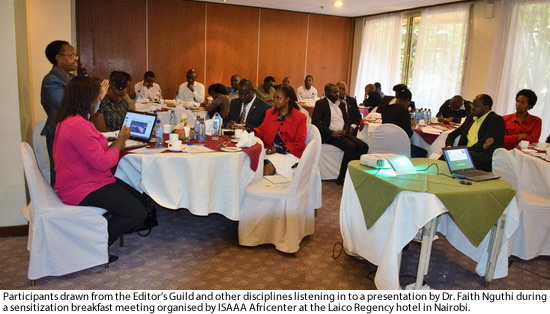
Kenyan Editors Urged to Rely on National Biosafety Authority for GMO Safety Matters
November 3, 2016| |
Over 20 editors from leading TV stations, local newspapers and magazines participated in an agri-biotech sensitization meeting on October 27, 2016, in Nairobi, Kenya. The meeting's objective was to update this key stakeholder group on on-going agri-biotech research initiatives in the country. While updating participants on the status of Kenya's biosafety framework, Dr. Willy Tonui, CEO National Biosafety Authority (NBA), noted that the country has served as a role model for Africa in addressing biosafety regulatory issues. "Kenya was the first country in the world to sign the Cartagena Protocol on Biosafety. The media should rely on NBA for safety matters as the national focal point on GMO issues in Kenya," he said.
Ms. Bibiana Iraki from ISAAA AfriCenter highlighted the effects of news values as well as the guidelines used by media to determine how much prominence to give science stories. "If we go by the same yardstick to determine what a good science story is, then science reporting is in trouble," she said. Editors were urged to reduce the use of conflict in capturing an audience's attention as it downplays the scientific angle of the story, making it hard for them to adequately educate the public.
Mr. Hassan Kulundu, Secretary General of the Editors Guild, appreciated the opportunity to interact with scientists and urged them to re-package their research findings in a simple and appealing manner for the media to pick up. "The buck stops with scientists. If research findings can be packaged to address real problems affecting people such as the current food shortages being experienced in the country, science stories can make headlines from January to December," said Mr. Hassan. In a bid to curb use of negative images by media in agri-biotech reporting, Dr. Nguthi urged scientists to volunteer appropriate pictures to journalists and editors. "After all, a picture is worth a thousand words," she said.
The meeting provided an opportunity for relationship building between editors and scientists, a key component for increased balanced reporting on agri-biotech and biosafety. It was co-organized by ISAAA AfriCenter, Open Forum on Agricultural Biotechnology – Kenya Chapter, and the Virus Resistant Cassava for Africa project.

For more information, contact Dr. Faith Nguthi on fnguthi@isaaa.org.
| |
Biotech Updates is a weekly newsletter of ISAAA, a not-for-profit organization. It is distributed for free to over 22,000 subscribers worldwide to inform them about the key developments in biosciences, especially in biotechnology. Your support will help us in our mission to feed the world with knowledge. You can help by donating as little as $10.
-
See more articles:
-
News from Around the World
- FAO Report Promotes Biotechnology as Key Tool in Facing Climate Change
- African Party State Delegates Converge for COP/MOP 8 Preparatory Workshop
- Kenyan Editors Urged to Rely on National Biosafety Authority for GMO Safety Matters
- Scientists Trace Evolution of Abscisic Acid
- Non-bruising GE Potato Cleared for Sale by USDA
- Meta-analysis in Mexico Confirms There are No Additional Risks in GM Maize Compared with Conventional Maize
- Scientists Find SGR Gene Induces Color Changes in Leaves
- Philippines Research Shows Bt Eggplant Does Not Harm Non-target Insects
- Research Team Develops Technique that Quickly Identifies Chemicals Affecting Plant Growth
- GM Crops Could Soon be Grown in UK After Brexit, Says Ag Minister
-
Research Highlights
- Overexpression of HvPAPhy_a Gene Increases Phytase Activity in Mature Barley Straw and Grains
- TaCAD12 Gene Contributes to Resistance to Sharp Eyespot Disease in Wheat
-
Resources
- ISAAA Infographic: Approved Transgenic Plant Events
-
Plant
- Researchers Review Opportunities Presented by CRISPR-Based Tools in Understanding Plant–Pathogen Interactions
- New Gene Editing Technology Cures Blood Disorder in Mice
-
Read the latest: - Biotech Updates (April 24, 2024)
- Gene Editing Supplement (April 24, 2024)
- Gene Drive Supplement (February 22, 2023)
-
Subscribe to BU: - Share
- Tweet
